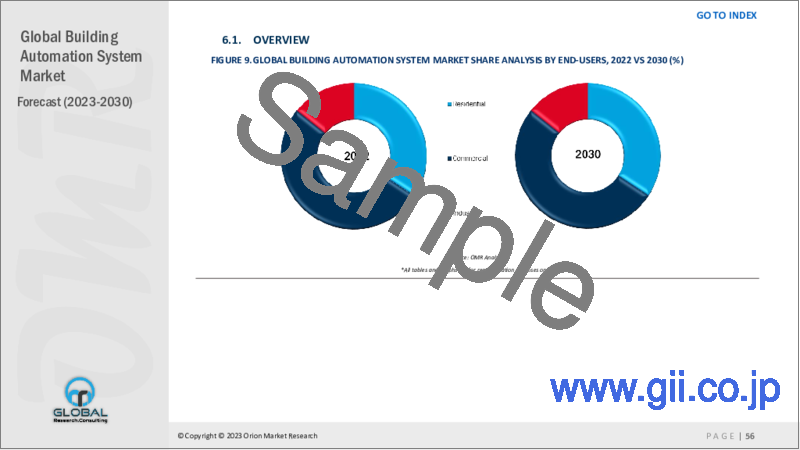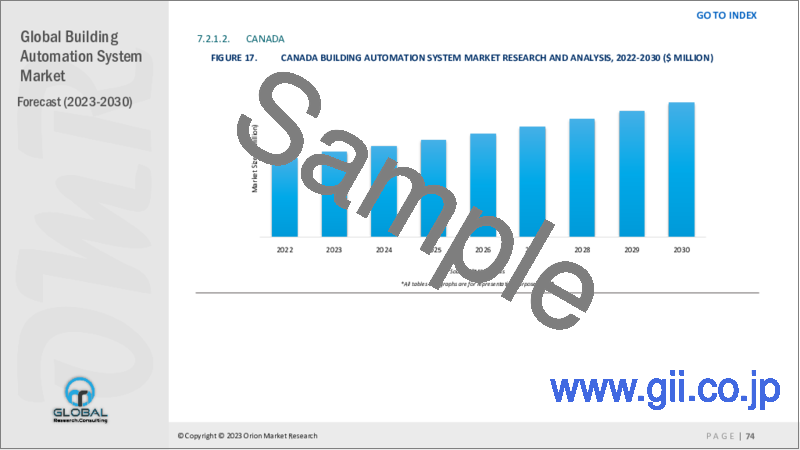|
|
市場調査レポート
商品コード
1363999
ビルオートメーションシステムの世界市場:2023-2030年Global Building Automation Systems Market 2023-2030 |
||||||
カスタマイズ可能
|
|||||||
| ビルオートメーションシステムの世界市場:2023-2030年 |
|
出版日: 2023年09月24日
発行: Orion Market Research
ページ情報: 英文 165 Pages
納期: 2~3営業日
|
- 全表示
- 概要
- 図表
- 目次
世界のビルオートメーションシステム市場は、予測期間中に10.8%という大幅なCAGRで成長すると予測されています。世界中でビルオートメーションシステムの導入が拡大していることが、ビルオートメーションシステムの世界市場の成長を促進する主な要因となっています。ビルオートメーションシステムは、建物の環境やオペレーティングシステムの制御、システム性能の監視などの機能を発揮し、それに基づいてシステムは必要に応じて警告音を発します。ビルの暖房、換気、空調(HVAC)、電気、照明、遮光、入退室管理、セキュリティシステム、その他相互に関連するシステムを集中的に制御します。夏季の気温上昇に伴う世界のエアコン需要の高まりが、ビルオートメーションシステム市場の需要をさらに高めています。アジア太平洋地域では、空調システムが以前にも増して普及し、手頃な価格で必要不可欠なものとなりつつあり、懸念が高まっています。
セグメント別展望
ビルオートメーション・ソフトウェア部門が最も高い成長を示す
ビルオートメーションにおけるソフトウェア・アプリケーションの増加は、この市場セグメントの成長を促進する重要な要因です。新しいソフトウェアの発売がこの市場セグメントの成長に寄与しています。例えば、2022年6月、シーメンス・スマート・インフラストラクチャーは、オープン、相互運用可能、完全クラウドベースの新しいスマートビルディング・スイート「Building X」を発表しました。このスイートは、シーメンスXceleratorの設計原則に基づいて構築された初の次世代製品であり、産業、輸送、グリッド、ビルディング全体のデジタルトランスフォーメーションと価値創造を加速するオープンデジタル・スマートビルディング・スイート・ビジネスプラットフォームです。
地域別展望
世界のビルオートメーションシステム市場は、北米(米国とカナダ)、欧州(イタリア、スペイン、ドイツ、フランス、その他)、アジア太平洋(インド、中国、日本、韓国、その他)、世界のその他の地域(中東とアフリカ、南米)など、地域別にさらに細分化されています。なかでもアジア太平洋地域は、インドや中国などの新興国でスマートビルの導入が進んでいることから、最も急成長している地域と推定されます。スマートシティプロジェクトなどの政府の取り組みが、ビルオートメーションシステム市場における同地域の地位をさらに強化しています。
2022年8月、韓国最大の通信会社であるKTは、子会社のKTエステートと共同で一連のスマートビルサービスを開始する予定です。新しいICTベースの統合サービスは、「スマート・ビル・センシング」と「スマート・ビルディングBEMS」で構成されます。現在、床面積1万平方メートル以上の公共建築物にはBEMSの設置が義務付けられています。2025年には、床面積1,000平方メートル以上の民間建築物、床面積500平方メートル以上の公共建築物にも拡大される予定です。地域全体でビルオートメーションシステムの導入を促進するこのような規制は、地域市場の成長にさらに貢献しています。
北米地域がビルオートメーションシステムの世界市場でかなりのシェアを占める
北米は、世界のビルオートメーションシステム市場でかなりのシェアを占めています。スマート技術の採用率が高いこと、ITインフラが広く整備されていることが、同地域市場の高シェアに貢献しています。企業は、この地域の建築エコシステムを改善するために持続可能な技術を導入しています。例えば、2021年9月、電化と持続可能な運用技術の開発企業であるTurntide Technologies社(「Turntide」)は、フルスタックのインテリジェントビルソリューションである新しいTurntide for Buildingsを発表しました。TurntideはSmart Motor SystemTMとオートメーションソフトウェア、接続されたエッジ機器、クラウドインサイトとを組み合わせ、ダウンタイムとメンテナンスコストを削減しながら、エネルギー効率を改善し、ビル運営を合理化します。
Turntide for Buildingsは、オーナー、管理者、オペレーターがHVACや照明、室内空気品質、エネルギー効率などのシステムを制御・維持するために必要な可視性を提供します。スマートモーターシステムやスマートサーモスタット、IAQセンサー、ゲートウェイ装置などのエッジ機器を含む、コネクテッド機器のエコシステムからデータを収集し、クラウドの洞察と制御機能のダッシュボードを提供することで、さまざまな場所でより効率的な監視と管理を可能にします。
目次
第1章 レポート概要
- 業界の現状分析と成長可能性の展望
- 調査方法とツール
- 市場内訳
- セグメント別
- 地域別
第2章 市場概要と洞察
- 調査範囲
- アナリストの洞察と現在の市場動向
- 主な調査結果
- 推奨事項
- 結論
第3章 競合情勢
- 主要企業分析
- Honeywell International Inc.
- 概要
- 財務分析
- SWOT分析
- 最近の動向
- Schneider Electric SE
- 概要
- 財務分析
- SWOT分析
- 最近の動向
- Trane Technologies
- 概要
- 財務分析
- SWOT分析
- 最近の動向
- Siemens AG
- 概要
- 財務分析
- SWOT分析
- 最近の動向
- Johnson Controls, Inc.
- 概要
- 財務分析
- SWOT分析
- 最近の動向
- 主要戦略分析
第4章 市場セグメンテーション
- 世界のビルオートメーションシステム市場:コンポーネント別
- ハードウェア
- ソフトウェア
- サービス
- 世界のビルオートメーションシステム市場:エンドユーザー別
- 住宅用
- 商業用
- 産業用
第5章 地域分析
- 北米
- 米国
- カナダ
- 欧州
- 英国
- ドイツ
- イタリア
- スペイン
- フランス
- その他欧州
- アジア太平洋
- 中国
- インド
- 日本
- 韓国
- その他アジア太平洋
- 世界のその他の地域
- ラテンアメリカ
- 中東・アフリカ
第6章 企業プロファイル
- ABB Ltd.
- Bajaj Electricals
- Building LogiX
- Carrier Corp.
- Cisco Systems Inc.
- Control4 Plc
- Delta Controls Inc.
- Distech Controls Inc.
- Emerson Electric Co.
- General Electric
- Hitachi Ltd.
- Huawei Technologies Corp.
- Hubbell Inc.
- Lennox International Inc.
- Lutron Electronics Co. Ltd.
- Mitsubishi Electric Corp.
- Oracle Corp.
- Robert Bosch GmbH.
- SAP SE
- United Technologies Corp.
LIST OF TABLES
- 1. GLOBAL BUILDING AUTOMATION SYSTEMS MARKET RESEARCH AND ANALYSIS BY COMPONENT, 2022-2030 ($ MILLION)
- 2. GLOBAL BUILDING AUTOMATION SYSTEMS HARDWARE MARKET RESEARCH AND ANALYSIS BY REGION, 2022-2030 ($ MILLION)
- 3. GLOBAL BUILDING AUTOMATION SYSTEMS SOFTWARE MARKET RESEARCH AND ANALYSIS BY REGION, 2022-2030 ($ MILLION)
- 4. GLOBAL BUILDING AUTOMATION SYSTEMS SERVICES MARKET RESEARCH AND ANALYSIS BY REGION, 2022-2030 ($ MILLION)
- 5. GLOBAL BUILDING AUTOMATION SYSTEMS MARKET RESEARCH AND ANALYSIS BY END-USER, 2022-2030 ($ MILLION)
- 6. GLOBAL BUILDING AUTOMATION SYSTEMS FOR RESIDENTIAL MARKET RESEARCH AND ANALYSIS BY REGION, 2022-2030 ($ MILLION)
- 7. GLOBAL BUILDING AUTOMATION SYSTEMS FOR COMMERCIAL MARKET RESEARCH AND ANALYSIS BY REGION, 2022-2030 ($ MILLION)
- 8. GLOBAL BUILDING AUTOMATION SYSTEMS FOR INDUSTRIAL MARKET RESEARCH AND ANALYSIS BY REGION, 2022-2030 ($ MILLION)
- 9. GLOBAL BUILDING AUTOMATION SYSTEMS MARKET RESEARCH AND ANALYSIS BY REGION, 2022-2030 ($ MILLION)
- 10. NORTH AMERICAN BUILDING AUTOMATION SYSTEMS MARKET RESEARCH AND ANALYSIS BY COUNTRY, 2022-2030 ($ MILLION)
- 11. NORTH AMERICAN BUILDING AUTOMATION SYSTEMS MARKET RESEARCH AND ANALYSIS BY COMPONENT, 2022-2030 ($ MILLION)
- 12. NORTH AMERICAN BUILDING AUTOMATION SYSTEMS MARKET RESEARCH AND ANALYSIS BY END-USER, 2022-2030 ($ MILLION)
- 13. EUROPEAN BUILDING AUTOMATION SYSTEMS MARKET RESEARCH AND ANALYSIS BY COUNTRY, 2022-2030 ($ MILLION)
- 14. EUROPEAN BUILDING AUTOMATION SYSTEMS MARKET RESEARCH AND ANALYSIS BY COMPONENT, 2022-2030 ($ MILLION)
- 15. EUROPEAN BUILDING AUTOMATION SYSTEMS MARKET RESEARCH AND ANALYSIS BY END-USER, 2022-2030 ($ MILLION)
- 16. ASIA-PACIFIC BUILDING AUTOMATION SYSTEMS MARKET RESEARCH AND ANALYSIS BY COUNTRY, 2022-2030 ($ MILLION)
- 17. ASIA-PACIFIC BUILDING AUTOMATION SYSTEMS MARKET RESEARCH AND ANALYSIS BY COMPONENT, 2022-2030 ($ MILLION)
- 18. ASIA-PACIFIC BUILDING AUTOMATION SYSTEMS MARKET RESEARCH AND ANALYSIS BY END-USER, 2022-2030 ($ MILLION)
- 19. REST OF THE WORLD BUILDING AUTOMATION SYSTEMS MARKET RESEARCH AND ANALYSIS BY COUNTRY, 2022-2030 ($ MILLION)
- 20. REST OF THE WORLD BUILDING AUTOMATION SYSTEMS MARKET RESEARCH AND ANALYSIS BY COMPONENT, 2022-2030 ($ MILLION)
- 21. REST OF THE WORLD BUILDING AUTOMATION SYSTEMS MARKET RESEARCH AND ANALYSIS BY END-USER, 2022-2030 ($ MILLION)
LIST OF FIGURES
- 1. GLOBAL BUILDING AUTOMATION SYSTEMS MARKET SHARE BY COMPONENT, 2022 VS 2030(%)
- 2. GLOBAL BUILDING AUTOMATION SYSTEMS MARKET SHARE BY END-USER, 2022 VS 2030(%)
- 3. GLOBAL BUILDING AUTOMATION SYSTEMS HARDWARE MARKET SHARE BY REGION, 2022 VS 2030(%)
- 4. GLOBAL RIGID BUILDING AUTOMATION SYSTEMS SOFTWARE MARKET SHARE BY REGION, 2022 VS 2030(%)
- 5. GLOBAL RIGID BUILDING AUTOMATION SYSTEMS SERVICE MARKET SHARE BY REGION, 2022 VS 2030(%)
- 6. GLOBAL BUILDING AUTOMATION SYSTEMS FOR RESIDENTIAL MARKET SHARE BY REGION, 2022 VS 2030(%)
- 7. GLOBAL BUILDING AUTOMATION SYSTEMS FOR COMMERCIAL MARKET SHARE BY REGION, 2022 VS 2030(%)
- 8. GLOBAL BUILDING AUTOMATION SYSTEMS FOR INDUSTRIAL MARKET SHARE BY REGION, 2022 VS 2030(%)
- 9. GLOBAL BUILDING AUTOMATION SYSTEMS MARKET SHARE BY REGION, 2022 VS 2030(%)
- 10. US BUILDING AUTOMATION SYSTEMS MARKET SIZE, 2022-2030 ($ MILLION)
- 11. CANADA BUILDING AUTOMATION SYSTEMS MARKET SIZE, 2022-2030 ($ MILLION)
- 12. UK BUILDING AUTOMATION SYSTEMS MARKET SIZE, 2022-2030 ($ MILLION)
- 13. FRANCE BUILDING AUTOMATION SYSTEMS MARKET SIZE, 2022-2030 ($ MILLION)
- 14. GERMANY BUILDING AUTOMATION SYSTEMS MARKET SIZE, 2022-2030 ($ MILLION)
- 15. ITALY BUILDING AUTOMATION SYSTEMS MARKET SIZE, 2022-2030 ($ MILLION)
- 16. SPAIN BUILDING AUTOMATION SYSTEMS MARKET SIZE, 2022-2030 ($ MILLION)
- 17. REST OF EUROPE BUILDING AUTOMATION SYSTEMS MARKET SIZE, 2022-2030 ($ MILLION)
- 18. INDIA BUILDING AUTOMATION SYSTEMS MARKET SIZE, 2022-2030 ($ MILLION)
- 19. CHINA BUILDING AUTOMATION SYSTEMS MARKET SIZE, 2022-2030 ($ MILLION)
- 20. JAPAN BUILDING AUTOMATION SYSTEMS MARKET SIZE, 2022-2030 ($ MILLION)
- 21. SOUTH KOREA BUILDING AUTOMATION SYSTEMS MARKET SIZE, 2022-2030 ($ MILLION)
- 22. REST OF ASIA-PACIFIC BUILDING AUTOMATION SYSTEMS MARKET SIZE, 2022-2030 ($ MILLION)
- 23. LATIN AMERICA BUILDING AUTOMATION SYSTEMS MARKET SIZE, 2022-2030 ($ MILLION)
- 24. MIDDLE EAST AND AFRICA BUILDING AUTOMATION SYSTEMS MARKET SIZE, 2022-2030 ($ MILLION)
Title: Global Building Automation System Market Size, Share & Trends Analysis Report by Component (Hardware, Software, Services), End-User (Residential, Commercial, Industrial), Forecast Period (2022-2030).
Global building automation system market is anticipated to grow at a significant CAGR of 10.8% during the forecast period. The growing adoption of building automation systems across the globe is a key factor driving the growth of the global building automation system market. Building automation systems exhibit functions such as control of the building's environment and operating systems and monitoring the system performance, based on which the systems produce sound alerts as required. It centrally controls the building's heating, ventilation, and air conditioning (HVAC), electrical, lighting, shading, access control, security systems, and other interrelated systems. The growing demand for air conditioners across the globe due to the rising temperatures during summer has further created demand for the building automation systems market. There are mounting concerns in the Asia-Pacific region, where air-conditioning systems are becoming more prevalent, affordable, and essential than ever before.
Segmental Outlook
The global building automation system market is segmented based on components and end-user. Based on components, the market is segmented into hardware, software, and services. Based on end-user industry, the market is segmented into residential, commercial, and industrial.
Building Automation Software segment to Exhibit Highest Growth
The increasing number of software applications in building automation is a key factor driving the growth of this market segment. New software launches are contributing to the growth of this market segment. For instance, in June 2022, Siemens Smart Infrastructure launched Building X, a new smart building suite that is open, interoperable, and fully cloud based. The suite is the first next generation offering built on the design principles of Siemens Xcelerator, an open digital Smart Building Suite business platform to accelerate digital transformation and value creation across industry, transportation, grids, and buildings.
Regional Outlook
The global building automation system market is further segmented based on geography, including North America (the US and Canada), Europe (Italy, Spain, Germany, France, and others), Asia-Pacific (India, China, Japan, South Korea, and others), and the Rest of the World (the Middle East & Africa and Latin America). Among these, Asia-Pacific is estimated to be the fastest-growing region owing to the growing adoption of smart buildings in emerging economies such as India & China. Government initiatives, such as smart city projects, have further strengthened the place of the region in the building automation system market.
In August 2022, KT, South Korea's largest telecommunications company, plans to launch a suite of smart building services in cooperation with its subsidiary, KT Estate. The new ICT-based integrated service consists of "Smart Building Sensing" and "Smart Building BEMS". Currently, public buildings with a floor space of 10,000 square meters or more are required to set up a BEMS. The regulation is scheduled to be extended in 2025 to private buildings with a floor space of 1,000 square meters or more and public buildings with a floor space of 500 square meters or more. Such regulations that promote the adoption of building automation systems across the region are further contributing to the regional market growth.
The North American region held a Considerable Share in the Global Building Automation System Market
North America held a considerable share of the global building automation system market. The high adoption rate of smart technologies, and the presence of wide and maintained IT infrastructure are the key contributors to the high share of the regional market. Companies are introducing sustainable technologies to improve the building ecosystem in the region. For instance, in September 2021, Turntide Technologies, ("Turntide"), a developer of electrification and sustainable operations technologies rolled out its new Turntide for Buildings, a full-stack intelligent building solution. Turntide combines its Smart Motor SystemTM with automation software, connected edge equipment, and cloud insights to improve energy efficiency and streamline building operations while reducing downtime and maintenance costs.
Turntide for Buildings gives owners, managers, and operators the visibility they need to control and maintain systems such as HVAC and lighting, indoor air quality, and energy efficiency. It collects data from an ecosystem of connected equipment including the Smart Motor System and edge equipment such as smart thermostats, IAQ sensors, and gateway devices, to provide a dashboard of cloud insights and control capabilities that enables more efficient oversight and management across a portfolio of locations.
Market Players Outlook
The major companies serving the global building automation system market include Honeywell International Inc., Schneider Electric SE, Trane Technologies, Johnson Controls, Inc. Emerson Electric Co., Siemens AG, and Baldor Electric (ABB Ltd.) among others. The market players are considerably contributing to the market growth by the adoption of various strategies, including mergers and acquisitions, partnerships, collaborations, funding, and new product launches, to stay competitive in the market. For instance, in January 2023, ABB Ltd. unveiled its smart building management systems (BMS) for the Middle East region. The ABB Cylon Smart Building Management Systems portfolio of products covers scalable automation and energy control for a wide variety of commercial or industrial buildings, regardless of size. The BMS enables buildings to automate functions and reduce energy costs with energy control and management. It also allows real-time monitoring and control of the building facility.
The Report Covers:
- Market value data analysis of 2022 and forecast to 2030.
- Annualized market revenues ($ million) for each market segment.
- Country-wise analysis of major geographical regions.
- Key companies operating in the global building automation system market. Based on the availability of data, information related to new product launches, and relevant news is also available in the report.
- Analysis of business strategies by identifying the key market segments positioned for strong growth in the future.
- Analysis of market-entry and market expansion strategies.
- Competitive strategies by identifying 'who-stands-where' in the market.
Table of Contents
1. Report Summary
- Current Industry Analysis and Growth Potential Outlook
- 1.1. Research Methods and Tools
- 1.2. Market Breakdown
- 1.2.1. By Segments
- 1.2.2. By Region
2. Market Overview and Insights
- 2.1. Scope of the Report
- 2.2. Analyst Insight & Current Market Trends
- 2.2.1. Key Findings
- 2.2.2. Recommendations
- 2.2.3. Conclusion
3. Competitive Landscape
- 3.1. Key Company Analysis
- 3.2. Honeywell International Inc.
- 3.2.1. Overview
- 3.2.2. Financial Analysis
- 3.2.3. SWOT Analysis
- 3.2.4. Recent Developments
- 3.3. Schneider Electric SE
- 3.3.1. Overview
- 3.3.2. Financial Analysis
- 3.3.3. SWOT Analysis
- 3.3.4. Recent Developments
- 3.4. Trane Technologies
- 3.4.1. Overview
- 3.4.2. Financial Analysis
- 3.4.3. SWOT Analysis
- 3.4.4. Recent Developments
- 3.5. Siemens AG
- 3.5.1. Overview
- 3.5.2. Financial Analysis
- 3.5.3. SWOT Analysis
- 3.5.4. Recent Developments
- 3.6. Johnson Controls, Inc.
- 3.6.1. Overview
- 3.6.2. Financial Analysis
- 3.6.3. SWOT Analysis
- 3.6.4. Recent Developments
- 3.7. Key Strategy Analysis
4. Market Segmentation
- 4.1. Global Building Automation Systems Market by Component
- 4.1.1. Hardware
- 4.1.2. Software
- 4.1.3. Services
- 4.2. Global Building Automation Systems Market by End-User
- 4.2.1. Residential
- 4.2.2. Commercial
- 4.2.3. Industrial
5. Regional Analysis
- 5.1. North America
- 5.1.1. United States
- 5.1.2. Canada
- 5.2. Europe
- 5.2.1. UK
- 5.2.2. Germany
- 5.2.3. Italy
- 5.2.4. Spain
- 5.2.5. France
- 5.2.6. Rest of Europe
- 5.3. Asia-Pacific
- 5.3.1. China
- 5.3.2. India
- 5.3.3. Japan
- 5.3.4. South Korea
- 5.3.5. Rest of Asia-Pacific
- 5.4. Rest of the World
- 5.4.1. Latin America
- 5.4.2. Middle East and Africa
6. Company Profiles
- 6.1. ABB Ltd.
- 6.2. Bajaj Electricals
- 6.3. Building LogiX
- 6.4. Carrier Corp.
- 6.5. Cisco Systems Inc.
- 6.6. Control4 Plc
- 6.7. Delta Controls Inc.
- 6.8. Distech Controls Inc.
- 6.9. Emerson Electric Co.
- 6.10. General Electric
- 6.11. Hitachi Ltd.
- 6.12. Huawei Technologies Corp.
- 6.13. Hubbell Inc.
- 6.14. Lennox International Inc.
- 6.15. Lutron Electronics Co. Ltd.
- 6.16. Mitsubishi Electric Corp.
- 6.17. Oracle Corp.
- 6.18. Robert Bosch GmbH.
- 6.19. SAP SE
- 6.20. United Technologies Corp.





